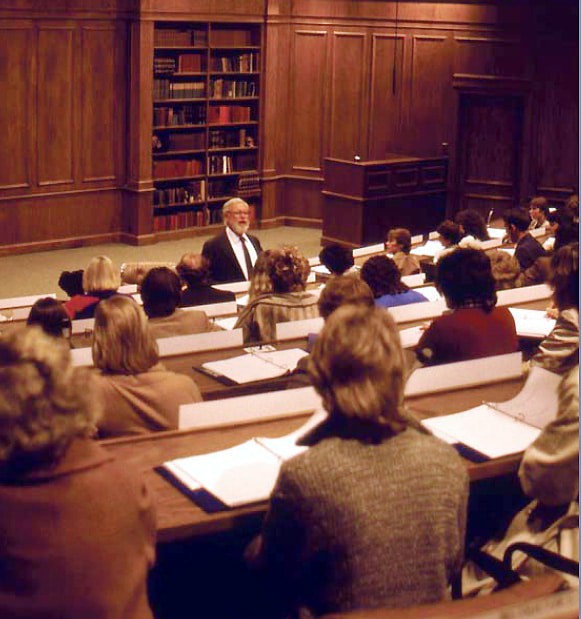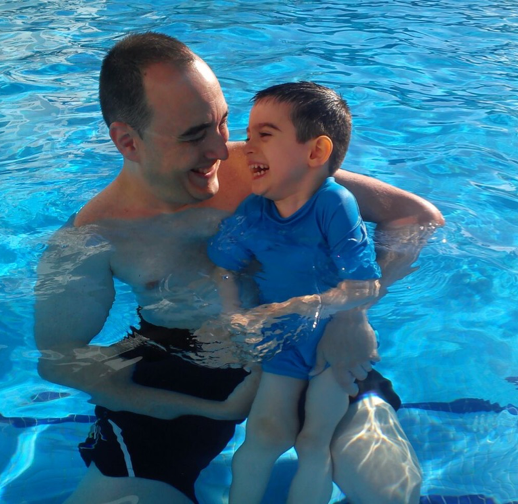Social Growth: Love, Respect, and The Law

It is a great compliment to a tiny child when his parents decide that he is ready for the earliest social program, “The Law.” The Law Program concerns the rules of behavior that will most benefit a child in relation to himself, his family and, eventually, to society as a whole.
Children understand a black-and-white world, shades of gray are difficult for them to comprehend
The purpose of creating a set of simple laws is to establish clear edges so that the child understands what is okay and what is not okay. Children understand a black-and-white world, it is the shifting shades of gray that are difficult for them to define and comprehend. The Law spells out in black and white just what is acceptable behavior in the household and what is not
Often parents begin with a Law that concerns their child’s safety, and for good reason. It is obvious how clear the message must be in order to be effective. “Do not touch the wall socket,” is clear, short, and to the point, as it needs to be.
Sometimes we forget to tell our child exactly what the Law is until it has been broken. To establish a Law in the family, it must first be announced and published.< <
Children learn laws best when they are presented frequently and consistently.
After deciding what will be their child’s first law, parents should write it out in large red print and post it in a prominent place. The next step is to announce the law so there is no doubt as to what it is. Once it is posted then it can be referred to easily and as often as is needed.
After the first law has been published and announced, both parents must be absolutely consistent in carrying it out. If the law reads “Do not throw food on the floor,” then food is not allowed to be thrown on the floor at any time – ever. If the law is only in effect when Mom and Dad have time, but is neglected or ignored when parents are in a hurry, or when grandmother is there, then the child is going to have a very difficult time learning it. Like any Bit of Intelligence, the child will learn social laws best when they are presented frequently and consistently. A broken law must have the same result each time it is broken, or the inconsistency will cause confusion and slow the learning process.
A simple and effective consequence for ignoring the law or neglecting it does make sense to the child.
A law will be as effective as the fine for breaking it. One of the most effective fines for a young child is time out, a short period out of the action. Sitting in the hallway while the family continues to enjoy dinner helps to create the desire to return under better circumstances. The parents have carefully considered which law is most important for their child’s development and his well-being. A simple and effective consequence for ignoring the law or neglecting it does make sense to the child. Of course, at first he may not like it. But it is remarkable how quickly he will accept the brief “time out”. At first he feels the pinch of it but as mother or father consistently uses the law he comes to see that he needs that “time out” to re-group, to get himself back to a calmer, happier place, and to rejoin the action.
Children can learn anything that is presented in an honest and factual way.
If the law is broken, a parent must be ready to enforce the fine immediately. The shorter the interval between the time the law is broken and the time the fine is imposed, the greater will be its effect. For the child, the connection between the two must be completely obvious. After all, one of the principles of child brain development is that children can learn anything that is presented in an honest and factual way. When a broken law results in an immediate fine, cause and effect are obvious. Imagine how muddy the experience becomes when cause and effect are minutes or even hours apart, as in “Wait until your father comes home.” How much clearer and kinder it is to provide the message immediately.
How often do we hear parents yelling or even screaming at their children?
Just by considering what law to establish for the household, parents begin to change the social environment. They see that their child is ready to appreciate the rules of a civilized society. What better place to learn these rules then within a loving family?
By publishing and posting the Law, they have made it clear to their child just exactly what those Laws are, and he finds it so much easier to learn because of their straightforward and civilized approach. How often do we hear parents yelling or even screaming at their children – sometimes very little children. We all know that this is inappropriate conduct for an adult and yet it is commonplace. Children endure it but we will pay the price for it later.
Balance and harmony, respect and love are at the heart of The Law

One of the best results of having successfully taught a child the first law is how much easier the next one is to teach. True, his parents are now more experienced, but perhaps even more significant, so is the child. He knows now that his parents mean what they say. This is essential. He respects them more because he knows they will follow through and keep their word. Parents also realize that they must keep their word. It is not fair to the child to be “making it up as we go along”. We need a plan and we need to follow that plan so that the child always knows what is expected. This is the very basis of a civilized society – fair, clear rules kept fairly.
The Result: The home becomes much more balanced and harmonious. Why? Parents respect the child more and the child returns that respect. When we add respect to the love we already have for our children everything, everything, everything gets better.
Establishing The Law is a great start for this.

Learn About _The How To Multiply Your Baby’s Intelligence course

 Donate
Donate








